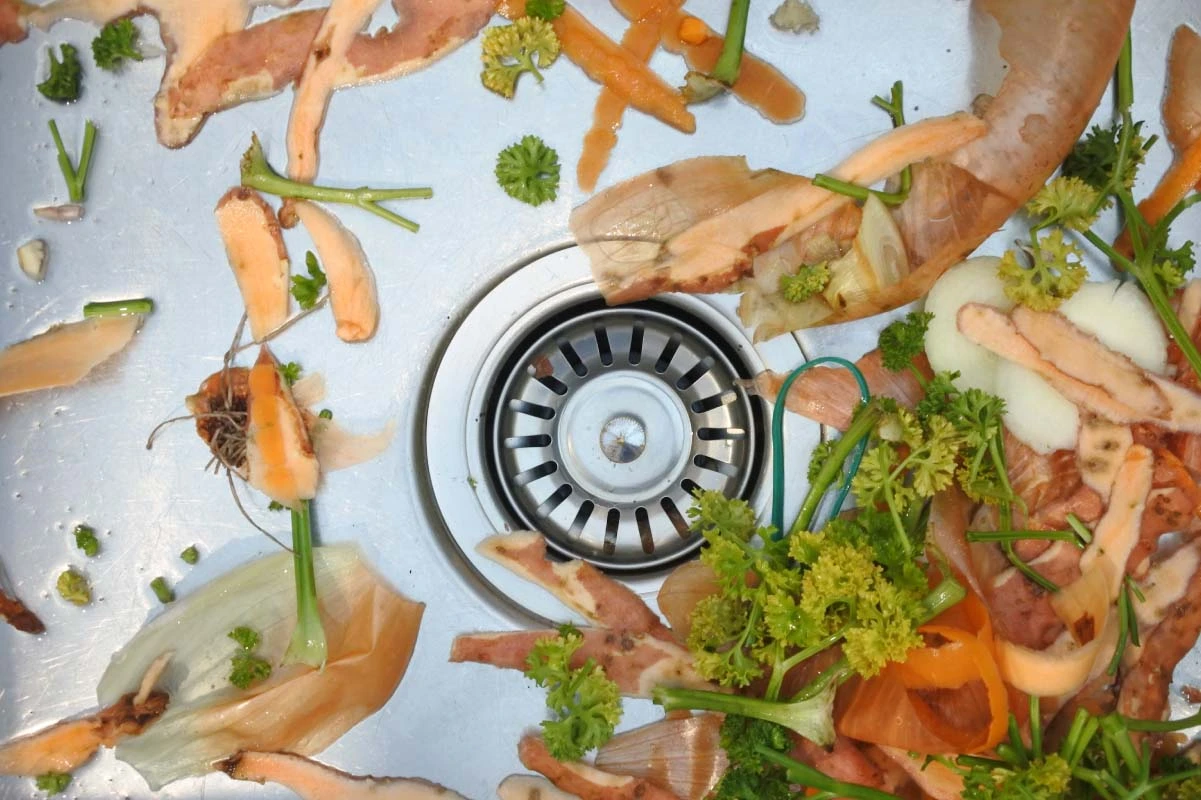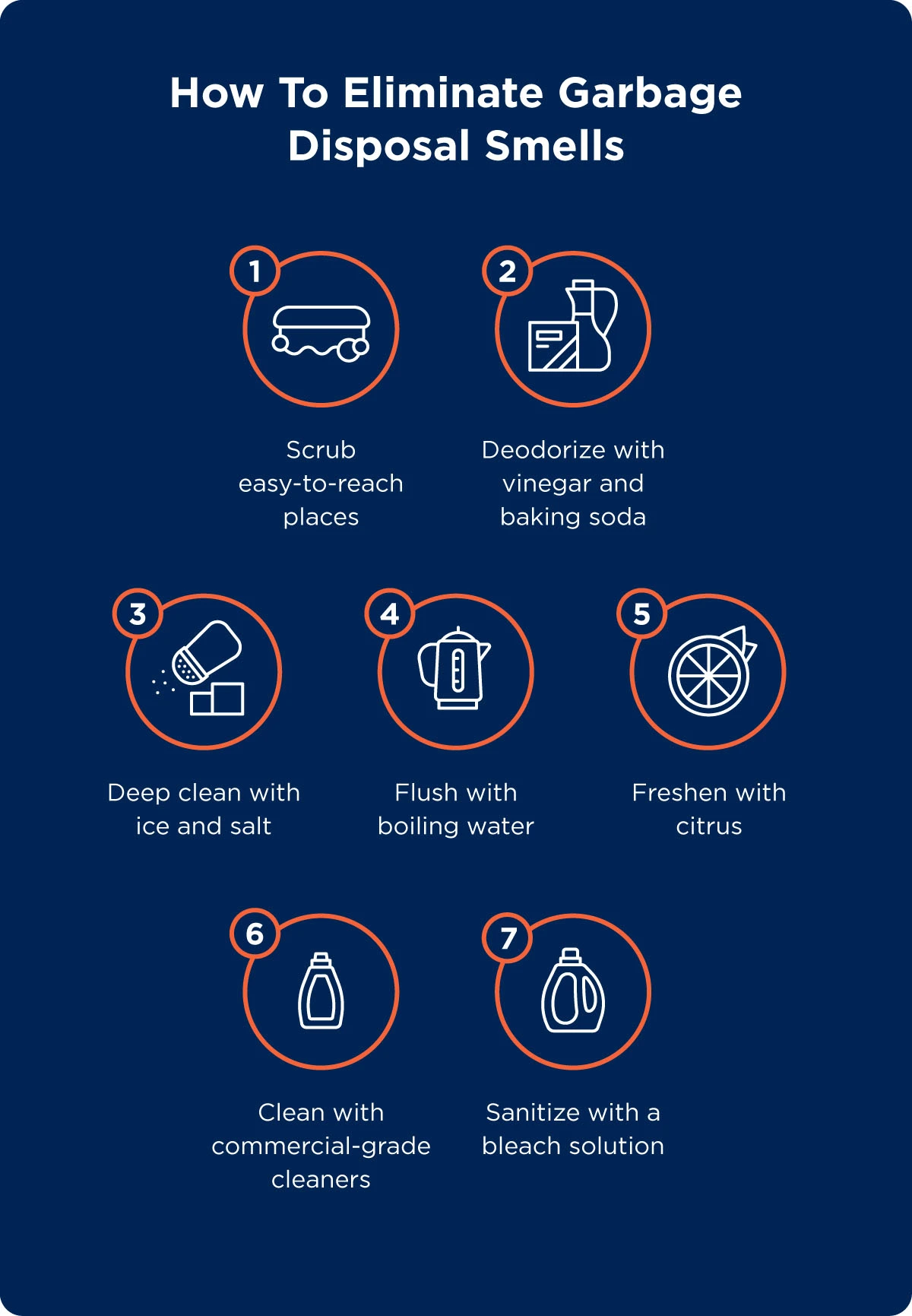Does Your Garbage Disposal Smell?

Banishing persistent garbage disposal smells is a common challenge many homeowners face. The unmistakable odor that wafts from your disposal can often be attributed to a buildup of food residue, grease, and bacterial growth within the confines of the appliance. Luckily, it’s fairly easy to eliminate unwanted odors and maintain a fresh-smelling disposal.
Routine cleaning with natural solutions like vinegar and baking soda or ice and salt can help keep garbage disposal smells at bay. However, you may need to resort to stronger chemical cleaning agents like bleach for stubborn stink.
From practical tips on routine appliance maintenance to targeted cleaning methods, this post will equip you with the knowledge to neutralize existing garbage disposal smells and keep them from reoccurring.
How To Get Rid of Garbage Disposal Smell
To maintain a fresh-smelling kitchen your garbage disposal should be kept in top condition, which includes following proper usage guidelines. For instance, run cold water while using the disposal to help flush away debris and avoid putting large or fibrous items, such as potato peels or coffee grounds, down the disposal.
If your garbage disposal has already succumbed to unwanted odors, neutralizing and eliminating them is easy. Follow these steps to refresh your smelly garbage disposal and keep your kitchen smelling clean and inviting.
1. Scrub With a Brush
The first step in addressing foul-smelling garbage disposal is to scrub the easy-to-reach surfaces of the sink and disposal. This includes cleaning the rubber splash guard and splatter-proof flaps at the mouth of the disposal. Food particles and residue can easily accumulate in this area, leading to unpleasant odors. Here's how to clean it:
- Ensure the disposal is switched off and unplugged for safety before starting.
- Use a long-handled brush, such as an old toothbrush or a specialized disposal cleaning brush, to reach into the nooks and crannies of the disposal’s rim, rubber splash guard, or splatter-proof flap.
- Apply a mixture of warm water and dish soap to the brush, scrubbing the surface of the flap thoroughly to dislodge any sludge or trapped debris.
- Remove the splash guard if possible to clean it more thoroughly.
- Rinse the area with warm water.
Keep in mind that you should never stick your hand into your disposal, even when it’s turned off. Tools like long-handled brushes are recommended to avoid accidents and ensure a safe cleaning process.
2. Freshen With Vinegar and Baking Soda
Vinegar and baking soda is a simple yet potent combination ideal for combating unpleasant odors. Here’s how to use this natural cleaning solution to ban garbage disposal smells:
- Pour half a cup of baking soda down the disposal. Allow it to settle and coat the sides and bottom of the disposal.
- Follow up with a cup of white vinegar after a few minutes. This dynamic duo creates a fizzing reaction that not only works to break down and neutralize odorous compounds but also helps sanitize the disposal.
- Add a few drops of essential oil, such as lemon or peppermint, for an extra aromatic boost.
- Plug the drain and wait 10-15 minutes for the mixture to work its magic as it lifts away debris and grime.
- Remove the plug and run cold water down the disposal to flush away the loosened grime, leaving your disposal refreshed and stink-free.
3. Deodorize With Ice and Salt
Kosher salt or rock salt are both abrasive enough to scrub the interior of the disposal without harming it and when used in conjunction with ice cubes, they make an effective solution to remove any stubborn, leftover gunk. To use this cleaning method:
- Pour two cups of ice cubes into the drain and turn on the disposal, letting them grind away to help dislodge built-up grime.
- Sprinkle a generous amount of coarse salt into the disposal while it runs, further assisting in removing stubborn debris.
- Run cold water down the disposal as it runs to wash away the loosened particles and salt residue.
Repeat this process once a week as a preventive measure to keep odors at bay and your garbage disposal in top condition.
Pro tip: Freeze ice cubes with equal parts water and white vinegar for an added dose of odor-busting power.4. Flush With Boiling Water
If you’re still experiencing unpleasant smells emanating from your garbage disposal, you may need to bring boiling water into the mix. The high temperature of the water helps break down grease and food particles that may be contributing to the stink.
- Gather baking soda, vinegar, and a kettle full of boiling water. This same mixture you used in Step 2 will create a mild chemical reaction that will loosen stuck-on debris deep in the interior of the unit.
- Repeat the instructions listed in step two to deodorize the disposal with vinegar and baking soda, but do not rinse the solution with cold water.
- Carefully pour the boiling water down the disposal to flush out the baking soda, vinegar, grease, and loosened food particles.
For an even more effective solution, incorporate a small amount of dish soap into the boiling water before pouring it down the disposal. The combination of hot water and soap works to emulsify and flush away grease and grime, leaving the disposal smelling as fresh as a daisy.
5. Clean With Citrus
Harnessing the natural power and refreshing scent of citrus is an excellent way to neutralize garbage disposal smells. Any time you have leftover lemon, orange, or lime peels, chop them up and toss them down the disposal along with cold running water to help control odors and grease.
This natural, environmentally friendly cleaning method not only effectively eliminates odors but also leaves behind a fresh and invigorating aroma in your kitchen. Regularly using citrus for garbage disposal maintenance can contribute to a clean and fragrant environment, making it a great alternative to commercial deodorizing agents.
6. Use Commercial Garbage Disposal Cleaners
While natural cleaning methods may be ideal for mild cases of disposal funk, there are times when you need the power of commercial-grade cleaners. These specialized cleaners typically come in the form of concentrated gels, foams, or granules that target grease, food particles, and other residues that can lead to unpleasant smells.
Follow the manufacturer's instructions for your particular cleaner, which typically involve:
- Turning off the disposal
- Applying the cleaner directly into the drain
- Allowing it to sit for a specified amount of time
Be careful not to get any on your skin — if you do, wash with water and soap immediately to prevent chemical burns.
While these cleaners can be highly effective, it's important to use them in moderation and follow safety guidelines, as some products may contain strong chemicals. Additionally, consider incorporating natural methods, like citrus or baking soda, into your routine maintenance to prevent resorting to harsh chemical cleaners.
7. Sanitize With a Bleach Solution
Bleach is a kitchen-cleaning staple, but there’s a reason why it’s the last step in the deodorizing process. You should only use bleach to sanitize your garbage disposal once a month at most — overusing bleach can be detrimental to the disposal components and pipes, potentially causing corrosion and damage over time.
If all else fails, follow these steps to banish garbage disposal smells once and for all with bleach:
- Mix a tablespoon of bleach with a cup of water, ensuring you use only a small amount of bleach to prevent damage to the disposal.
- Pour the solution down the disposal, allowing it to reach and disinfect the interior surface.
- Let the bleach solution sit for a few minutes to effectively combat bacteria and eliminate lingering odors.
- Run cold water down the disposal for at least 30 seconds to flush out the bleach and any loosened debris.

Why Does My Garbage Disposal Stink? (+ Prevention Tips)
While garbage disposals are self-cleaning by design, it is easy for particles of organic material to build up over time and adhere to the walls of the disposal, grinders, or even the flange. Your garbage disposal smells may be attributed to the following:
- Food residue buildup: Leftover food particles can accumulate and decay, leading to foul smells.
- Grease and fat deposits: Grease and other fats can solidify and contribute to odor when they adhere to the disposal and pipes.
- Lack of cleaning: Infrequent or improper cleaning allows bacteria and mold to thrive, emitting unpleasant odors.
- Inadequate flushing: Not using enough water during and after disposal use may allow residues to linger.
Regular maintenance is necessary not only to combat and prevent these odors but also to prevent blockages and keep your disposal spinning freely. Consider the following tips to keep your disposal smelling fresh:
- Clean weekly: Clean your disposal at least once a week using natural solutions like vinegar and baking soda or commercial-grade cleaners.
- Flush with cold water: Run cold water for at least 15 seconds before and after using the disposal to flush away debris.
- Avoid putting certain items in the disposal: Refrain from disposing of items like coffee grounds, fibrous vegetables, and large quantities of grease.
- Freshen with citrus: Drop citrus peels into the disposal and grind them to naturally freshen and combat odor.
- Use bleach to sanitize: Use diluted bleach solutions occasionally to sanitize and eliminate bacteria.
Still Smelly? Call Mr. Appliance
If you’ve gone through all the disposal-deodorizing steps and your garbage disposal still smells, it may be a sign of more serious underlying issues that require expert attention. Lingering odors could result from a clogged garbage disposal, damaged components, or issues with the disposal's mechanics.
A professional inspection can identify and address these problems, ensuring the long-term efficiency and cleanliness of your appliance. Contact the experienced team of service professionals at your local Mr. Appliance for fast, reliable garbage disposal repair so you can get back to a fresh-smelling home.
Garbage Disposal Cleaning FAQ
Whether you're seeking advice on routine maintenance or actively battling a smelly garbage disposal, we’ve provided expert insights and practical tips to ensure your garbage disposal remains in top condition.
How Often Should You Deodorize Your Garbage Disposal?
How often you should deodorize your garbage disposal depends on how often you use it. As a general guideline, clean and deodorize it at least once a week to prevent the buildup of lingering smells. However, adjust the frequency based on your disposal's activity and any signs of persistent odors.
Why Does My Garbage Disposal Smell Even After Cleaning?
Lingering odors in your garbage disposal after cleaning may be attributed to:
- Hidden residue: Despite cleaning efforts, some food particles may remain hidden in hard-to-reach areas, contributing to lingering odors.
- Bacterial growth: The disposal's moist and dark environment can foster the growth of bacteria and mold, leading to persistent smells even after cleaning.
- Inadequate cleaning: If cleaning methods don't effectively address the source of the odor or if the disposal components are not cleaned thoroughly, smells may persist.
To address this issue, consider leveling up your cleaning routine, ensuring you reach all areas, and using natural deodorizing agents like citrus or baking soda. In some cases, you may need to resort to stronger commercial-grade cleaners or bleach. If the problem persists, it might be worth consulting a professional or checking for any underlying issues with the disposal unit itself.
Is It OK To Pour Bleach Down a Garbage Disposal?
You should not pour straight bleach down the garbage disposal because it can corrode and damage your disposal and plumbing components. However, it is generally safe to use a diluted bleach solution occasionally to sanitize the disposal.
This article is intended for general guidance only and may not apply to every situation. You are responsible for determining the proper course of action for your property and your situation. Mr. Appliance is not responsible for any damages that occur as a result of any advice or guidance derived from blog content. For the most accurate guidance, contact an independently owned and operated Mr. Appliance business for a professional custom and on-site assessment.
 Click to call
Click to call


